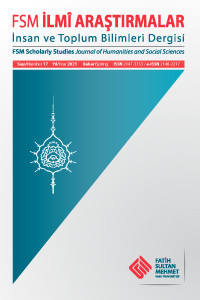Bilimsel Tefsir Ekolünde Klasik ve Modern Dönem Metot ve Argümanlarının Mukayesesi ve Yaklaşım Farklılıkları
Kur’ân-ı Kerîm, temelde insanların hidayetini hedeflemiş olsa da bu hedef için
kullandığı bazı argümanlar bilimsel olgularla ilişkilidir. Hatta bunlardan bazıları, kimi ilim
adamlarınca ilmî iʻcâz olarak ifade edilen bilimsel mucizeler de içermektedir. Kur’an’ın
bu nitelikte ayetleri modern dönemde “bilimsel tefsir” adı verilen bir tefsir türünü ortaya
çıkarmış gerek klasik gerekse modern dönemde bu alanda çeşitli eserler yazılmıştır. Bu
zamana kadar bilimsel tefsir alanında yazılmış eserler genel olarak ayetlerin bilimle
irtibatlarının yanında, bilimsel tefsiri destekleyenler ve karşıtlarının ele alındığı, bunların
kabul ve red açısından gerekçelerini sunar mahiyettedir. Bizim çalışmamızda ise bu
iki grup arasındaki karşıtlıktan ziyade, bazı örneklerden hareketle Klasik ve Modern
Dönemde kevnî âyetlerin tefsiri için kullanılan argümanlar ve metodolojinin tespiti
için gayret edilmiştir. Ayrıca bir genel kabul olarak Gazzâlî ile başlatılan bilimsel tefsir
ekolünün, ondan önceki nüvelerinin ortaya çıkarılmasına çalışılmıştır.
Comparison and Differences in Approach of Classical and Modern Period Methods and Arguments in the School of Scientific Tafseer
Qur’an basically Aims to guide human beings. Besides, some of the arguments
Qur’an used for this goal are related to the scientific facts. A few of them even contain the
scientific miracles, which are referred as iʻjaz al-ilmi (scientific iʻjaz) by some scholars.
The verses of the Qur’an of this nature have given rise to a type of tafseer called
“scientific tafseer” in the modern period, and various works have been written in this
field both in the classical and modern periods. So far, the works in the field of scientific
tafseer have predominantly focused on exploring the relationship between Quranic verses
and scientific concepts. These works also discuss the proponents and critics of scientific
tafseer, presenting the reasons for both its acceptance and rejection. In our study, rather
than the contrast between these two groups, an effort has been made to determine the
arguments and methodology used for the interpretation of the kawnî (cosmic) verses in
the Classical and Modern Period, based on some examples. In addition, as a general
acceptance, an attempt has been made to reveal the scientific school of tafseer initiated by
al-Ghazālī and its predecessors
